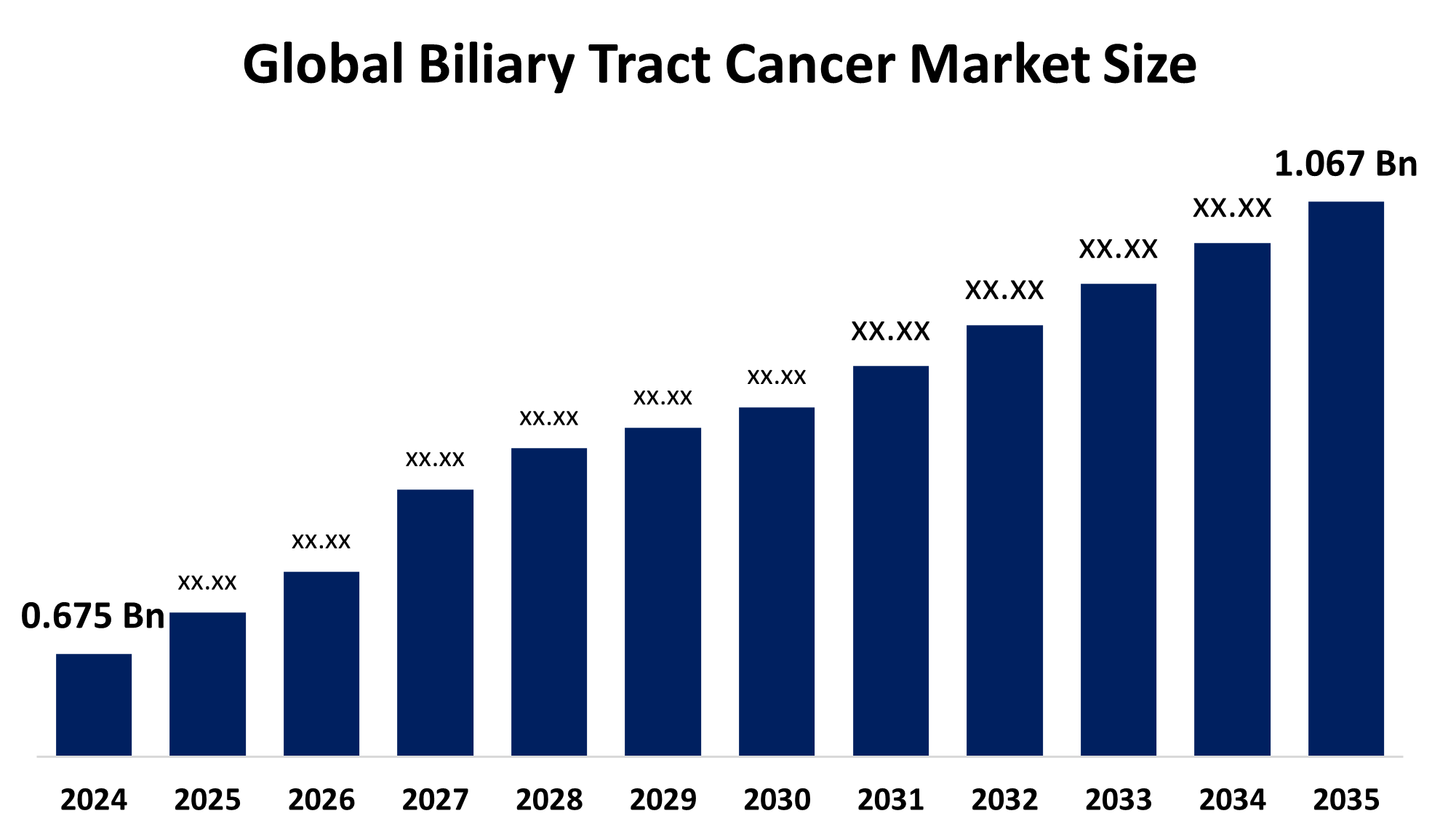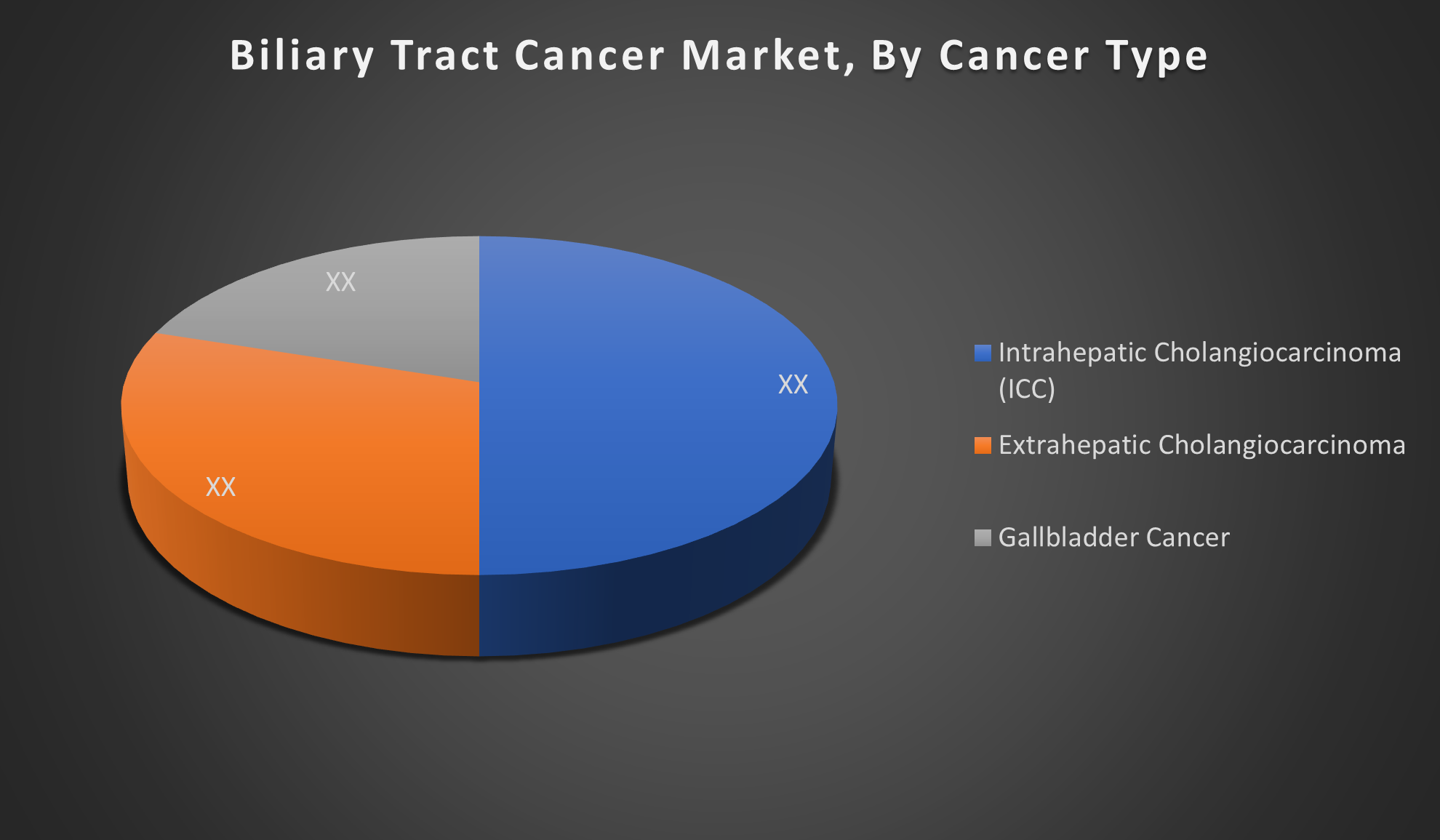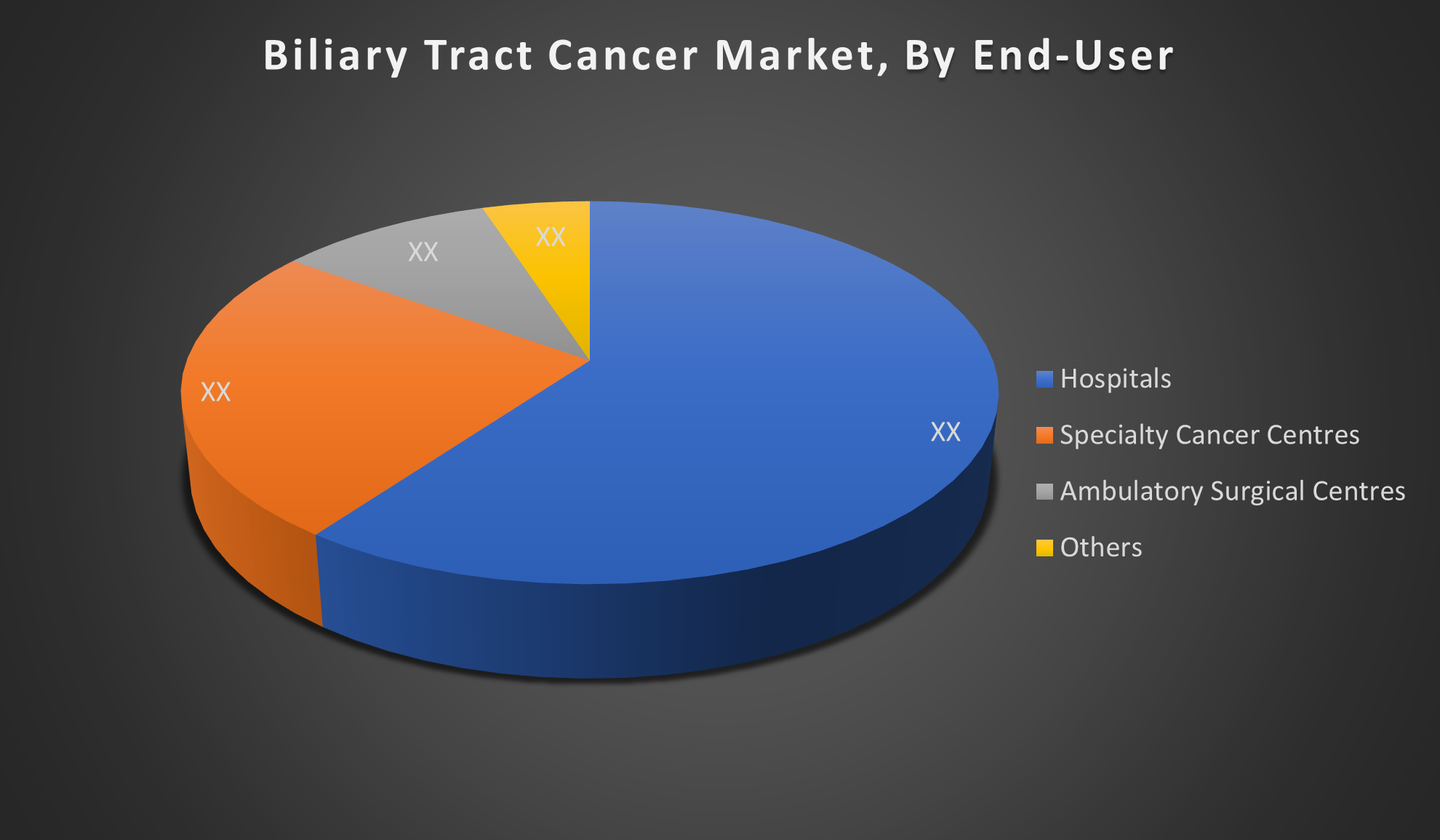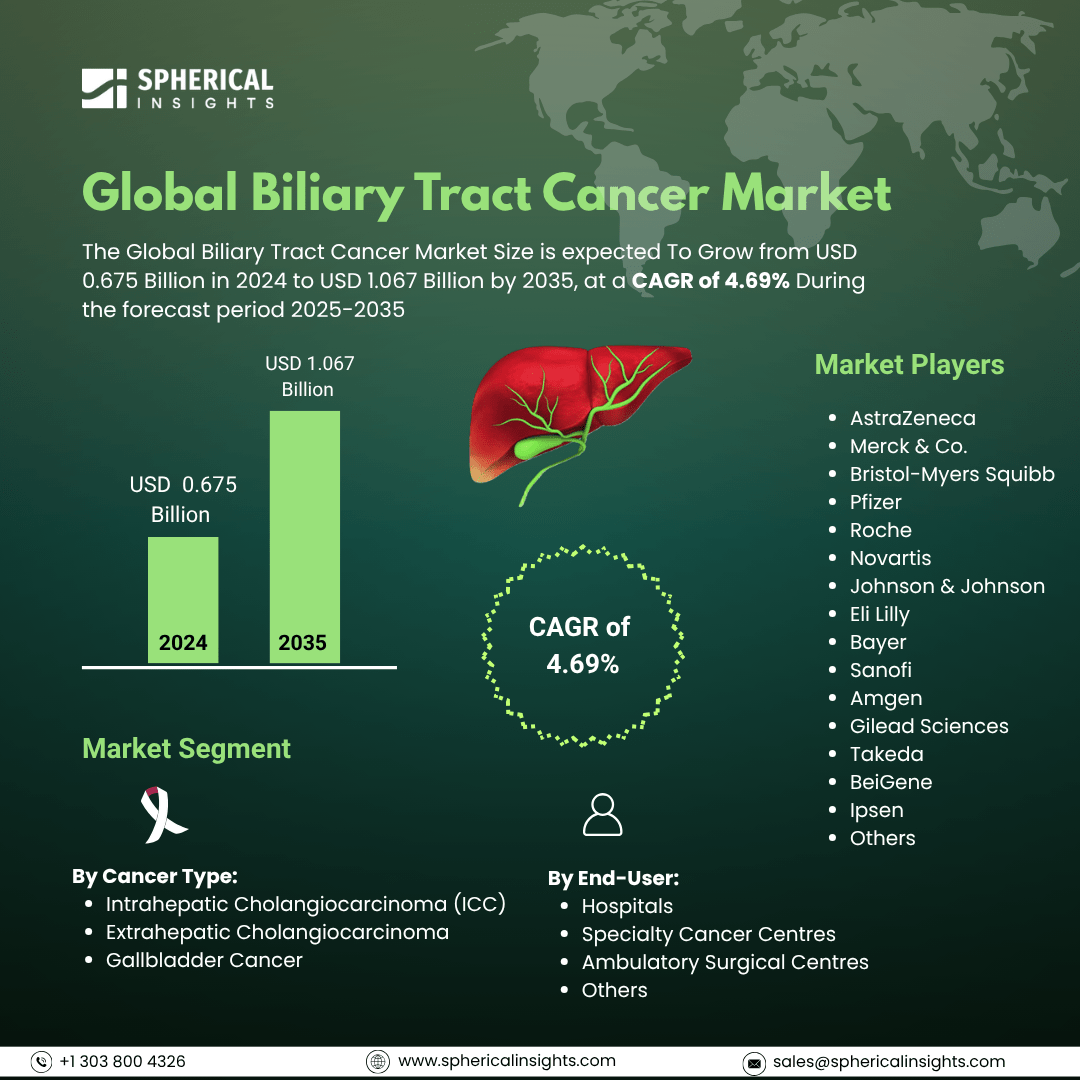- As per Spherical Insights & Consulting, The Global Biliary Tract Cancer Market Size is expected To Grow from USD 0.675 Billion in 2024 to USD 1.067 Billion by 2035, at a CAGR of 4.69% during the forecast period 2025-2035, owing to the launch of new therapies in the market and the rise in the number of cases.
- The leading Biliary Tract Cancer Market Companies such as AstraZeneca, Merck & Co., Bristol-Myers Squibb, Pfizer, Roche, Novartis, Johnson & Johnson, Eli Lilly, Bayer, Sanofi, Amgen, Gilead Sciences, Takeda, BeiGene, Ipsen, and Others.

Biliary Tract Cancer Treatment Market: Understanding and Treatment Algorithm:
Biliary tract cancer is a rare but aggressive cancer that originates in the bile ducts, gallbladder, ampulla of vater, or related structures responsible for bile transport from the liver to the intestines. It often presents late, causing symptoms like jaundice, and requires complex treatment including surgery, chemotherapy, and targeted therapies.
Biliary Tract Cancer Diagnosis:
Diagnosis typically involves imaging techniques such as ultrasound, CT scans, and MRI to detect tumours in the biliary system. Endoscopic procedures like ERCP (endoscopic retrograde cholangiopancreatography) help visualize bile ducts and obtain tissue samples. Blood tests, including tumour markers (e.g., CA 19-9), and biopsy confirm the diagnosis and guide treatment planning.
Biliary Tract Cancer Treatment
Treatment depends on the cancer stage and location, often involving surgery to remove tumours when possible. Chemotherapy and radiotherapy are used to control advanced or inoperable cases. Targeted therapies and immunotherapies are emerging options to improve outcomes. Palliative care focuses on symptom relief and quality of life.
Biliary Tract Cancer Epidemiology
The disease epidemiology covered in the report provides historical as well as forecasted epidemiology segmented by Total Diagnosed Incident Population of Biliary Tract Cancer, Gender-specific Diagnosed Incidence of Biliary Tract Cancer, Type-specific Diagnosed Incidence of Biliary Tract Cancer, Age-specific Diagnosed Incidence of Biliary Tract Cancer, Diagnosed Incident Population based on Primary Site of Biliary Tract Cancer, and Diagnosed Incident Population based on Histologic Classification of Biliary Tract Cancer Tumour in the global market covering North America, Europe, Asia-Pacific, Latin America, the Middle East, and Africa from 2024 to 2035.
Principal Insights
This section offers a global overview of biliary tract cancer epidemiology in major markets worldwide.
Country Wise- Biliary Tract Cancer Multiforme Epidemiology
- The epidemiology segment provides Biliary Tract Cancer prevalence data and findings across key regions worldwide, including North America, Europe (Germany, France, Italy, Spain, and the United Kingdom), Asia-Pacific (including Japan), Latin America, the Middle East, and Africa.
Biliary Tract Cancer Recent Developments:
- In April 2025, Gilead Sciences announced that it would present new research at the European Association for the Study of the Liver (EASL). The findings would include data from the ASSURE and RESPONSE trials, demonstrating the effectiveness of Livdelzi (seladelpar) in reducing pruritus and achieving sustained biochemical responses in patients with primary biliary cholangitis (PBC). Additionally, the company planned to showcase long-term data on bulevirtide for hepatitis delta virus (HDV) treatment, reinforcing its commitment to advancing liver disease therapies.
Biliary Tract Cancer Marketed Drugs:
- Tafinlar + Mekinist: Novartis
Tafinlar (dabrafenib) combined with Mekinist (trametinib) targets BRAF V600E mutations and is approved for biliary tract cancers harboring this mutation, offering targeted therapy options for patients.
Zejula (niraparib) is an oral PARP inhibitor that blocks DNA repair in cancer cells, leading to cell death, especially in tumours with homologous recombination deficiency (HRD). It is under clinical investigation for biliary tract cancer patients harboring specific genetic mutations, aiming to extend progression-free survival and provide a new treatment option beyond chemotherapy.
- Zepzelca: Jazz Pharmaceuticals
Zepzelca (lurbinectedin) is a chemotherapy agent approved for small cell lung cancer and currently being studied in biliary tract cancers. It binds to DNA, disrupting cancer cell replication and promoting apoptosis. Early trials suggest potential benefits in resistant biliary tract cancer cases when combined with other therapies.
Biliary Tract Cancer: Emerging Therapies
- Zanidatamab: It is a bispecific antibody targeting HER2-positive biliary tract cancers. It binds two distinct HER2 epitopes, enhancing tumour cell destruction. Recently approved in some regions, it offers a novel targeted option for HER2-expressing tumours.
- Derazantinib: It is an FGFR inhibitor under clinical development for FGFR2 fusion-positive cholangiocarcinoma. It blocks pathways essential for tumour growth and has shown encouraging results in Phase 2 trials.
- BNT211: It is a CAR-T cell therapy targeting Claudin-6 (CLDN6), showing promise in solid tumours, including biliary tract cancer. It combines CAR-T cells with a vaccine to boost the immune response, currently in early-phase clinical trials.
- Sitravatinib: It is a multi-kinase inhibitor combined with immunotherapy being studied for advanced biliary tract cancers to overcome resistance and improve immune response.
Biliary Tract Cancer Market Outlook
- The biliary tract cancer market encompasses the development, production, and commercialization of diagnostic tools, drugs, and therapies designed to detect, treat, and manage cancers originating in the bile ducts, gallbladder, and related biliary structures, driven by increasing incidence and advances in targeted and immunotherapies.
- Increasing global incidence rates, development of targeted and immunotherapeutic treatments, enhanced diagnostic capabilities, heightened awareness for timely diagnosis, rising healthcare spending, and strong governmental support are major drivers of the biliary tract cancer market’s growth.
- Market opportunities in biliary tract cancer include the development of novel targeted therapies and immunotherapies, expanding personalized medicine approaches, increasing clinical trials, growing healthcare infrastructure in emerging regions, rising patient awareness, and collaborations between biotech and pharmaceutical companies to address unmet treatment needs.
- Governments globally are enhancing research and treatment for biliary tract cancer through funding and infrastructure development.
- Major challenges in biliary tract cancer management are delayed diagnosis, restricted treatment options, tumour heterogeneity, and expensive therapies.
- The market is projected to grow rapidly due to rising incidence rates, advancements in targeted therapies, and increased adoption of personalized medicine.
Biliary Tract Cancer Market Segmentation
By Cancer Type:
- Intrahepatic Cholangiocarcinoma (ICC)
- Extrahepatic Cholangiocarcinoma
- Gallbladder Cancer

The Intrahepatic Cholangiocarcinoma (ICC) segment dominates the biliary tract cancer market due to its increasing incidence worldwide and challenging diagnosis. ICC often presents late with aggressive behaviour, driving demand for advanced treatments and research, thereby capturing the largest market share among biliary tract cancer types.
By End-User:
- Hospitals
- Specialty Cancer Centres
- Ambulatory Surgical Centres
- Others

The Hospitals segment dominates the biliary tract cancer market as they provide comprehensive diagnosis, treatment, and post-operative care. Their advanced infrastructure, availability of multidisciplinary teams, and capability to handle complex cancer cases make hospitals the primary choice for patients, resulting in the largest market share.
Regional Segment Analysis of the Biliary Tract Cancer Market
North America leads the global biliary tract cancer market due to a combination of advanced healthcare infrastructure, high awareness, early diagnosis capabilities, and widespread access to cutting-edge treatments. The United States, in particular, contributes significantly due to its robust oncology research ecosystem, a strong presence of leading pharmaceutical companies, and a high incidence of biliary tract cancers relative to other regions. Government support, insurance coverage, and a growing number of clinical trials targeting bile duct and gallbladder cancers further solidify North America's position as the market leader.
The Asia-Pacific region is the fastest-growing in the global biliary tract cancer market. This rapid expansion is primarily fueled by rising incidence rates of cholangiocarcinoma and gallbladder cancer, particularly in countries like China, Thailand, India, and South Korea. Key contributing factors include higher prevalence of risk conditions such as hepatitis B and C, liver fluke infections, and increasing exposure to carcinogens. Additionally, significant improvements in healthcare access, medical infrastructure, and government health initiatives, combined with growing investments in diagnostics and oncology treatment, are accelerating market growth across the region.
Biliary Tract Cancer Market Key Companies
- AstraZeneca
- Merck & Co.
- Bristol-Myers Squibb
- Pfizer
- Roche
- Novartis
- Johnson & Johnson
- Eli Lilly
- Bayer
- Sanofi
- Amgen
- Gilead Sciences
- Takeda
- BeiGene
- Ipsen
- Others
Biliary Tract Cancer Therapeutics Market Report Scope
- The Biliary Tract Cancer therapeutics market report provides a detailed overview, covering its causes, symptoms, disease progression, and existing treatment options.
- Detailed insights into Biliary Tract Cancer’s epidemiology and therapeutic approaches are included.
- Additionally, a comprehensive review of existing and emerging Biliary Tract Cancer therapies is provided, including an evaluation of new treatments expected to influence the current Biliary Tract Cancer treatment market landscape.
- The report includes a detailed review of the Biliary Tract Cancer therapeutics market, both historical and forecasted, highlighting the global drug reach.
- The Patient-Based Biliary Tract Cancer Market Forecasting report offers valuable insights into trends shaping the global Biliary Tract Cancer market, helping to develop effective business strategies.
Biliary Tract Cancer Treatment Market Report Insights
- Forecasting Market Trends Based on Patient Data and Disease Rates
- Biliary Tract Cancer Therapeutic Approaches in Biliary Tract Cancer
- Review Of Drugs in Development for Biliary Tract Cancer
- Market, Growth, and Trends in Biliary Tract Cancer
- Market Opportunities in Biliary Tract Cancer Treatment
- Effects Of Future Therapies on Biliary Tract Cancer Treatment.
Biliary Tract Cancer Treatment Market Report Key Strengths
- 15 Years Biliary Tract Cancer Market Forecast
- Global Coverage
- Biliary Tract Cancer Epidemiology Segmentation
- Key Cross Competition
Biliary Tract Cancer Treatment Market Report Assessment
- Present Practices in the Biliary Tract Cancer Treatment Market
- Review of Investigational Biliary Tract Cancer Drugs
- Attractiveness of the Biliary Tract Cancer Drug Market
- Biliary Tract Cancer Market Drivers
- Biliary Tract Cancer Market Barriers
- SWOT
- Attribute Analysis
Market Segment
This study forecasts revenue at the global, regional, and country levels from 2020 to 2035. Spherical Insights has segmented the biliary tract cancer market based on the below-mentioned segments:
Global Biliary Tract Cancer Market, By Cancer Type
- Intrahepatic Cholangiocarcinoma (ICC)
- Extrahepatic Cholangiocarcinoma
- Gallbladder Cancer
Global Biliary Tract Cancer Market, By End-User
- Hospitals
- Specialty Cancer Centres
- Ambulatory Surgical Centres
- Others
Global Biliary Tract Cancer Market, By Regional Analysis
- North America
- Europe
- Germany
- UK
- France
- Italy
- Spain
- Russia
- Rest of Europe
- Asia Pacific
- China
- Japan
- India
- South Korea
- Australia
- Rest of Asia Pacific
- South America
- Brazil
- Argentina
- Rest of South America
- Middle East & Africa
- UAE
- Saudi Arabia
- Qatar
- South Africa
- Rest of the Middle East & Africa






